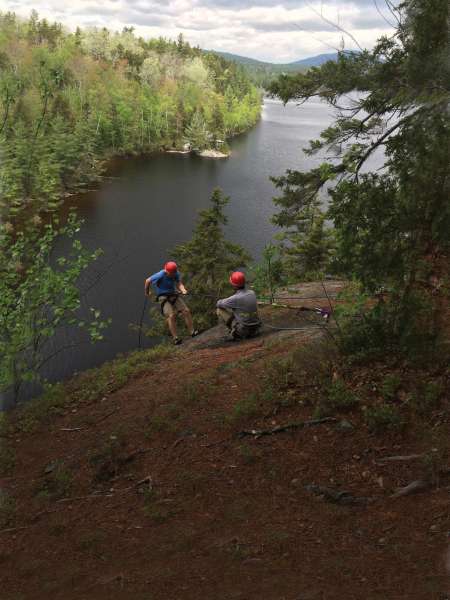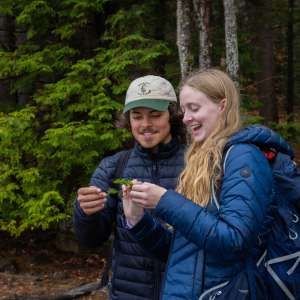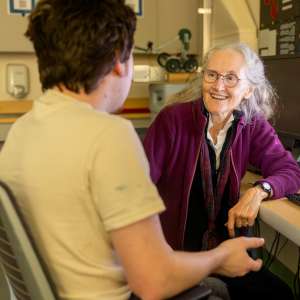Learning Leadership and Stewardship

Getting people out and active in the back country is a great way to create more advocates for protecting the wilderness. But the more people who make use of such natural areas, particularly those participating in recreational activities, the bigger the impact on the environment.
“It’s a little bit of a double-edged sword,” says Sandra Howard, an associate professor of music who swaps out her conductor’s baton for a trekking pole twice a year to teach a between-semester course, Outdoor Rec Leadership. That double edge is why she includes Leave No Trace certification in the course, a week-long experience hosted by Northern Outdoors, an adventure resort in a remote part of northwest Maine, that she leads with her husband, Lecturer Brent Arsenault.
The students learn about leadership, interpersonal dynamics, group facilitation, and environmental responsibility via hiking, rock climbing, maneuvering through high and low ropes courses, backpacking, map and compass navigation, and, depending on the season, whitewater rafting or skiing and snowshoeing.
With an approach based in multiple perspectives – physical education, environmental science, sociology, and communication – Outdoor Rec Leadership appeals to students from a variety of majors. Howard notes that students in the Sustainable Product Design and Innovation (SPDI) program particularly connect with an overnight stay in an off-the-grid, sustainable hut with solar and hydroelectric energy and a composting toilet – a seven-mile hike down the Maine Huts and Trails system. “Everyone brings with them whatever their experience is,” she says. “Everyone finds a way to relate through doing these activities and putting themselves out of their comfort zones.”
The course is open to students in all fields and to those with little to lots of outdoor rec experience. Howard and Arsenault, longtime Registered Maine Guides at Northern Outdoors, work with management majors, SPDI majors, education majors, communication majors, music majors, and more. They all learn about leadership and about being mindful of what Howard calls “the trample effect” – the impact that humans can have on the land. Several have even gone on to work as whitewater rafting guides and on ski patrols.
“A lot of students are driven to the course because it satisfies a requirement they need,” says Howard, “or they like the outside activity, but the big piece that they end up realizing at the end of the week is that they have had a chance to disconnect from devices and really think about people in their lives who’ve influenced them with leadership, or what kind of person they want to be when they’re in whatever their role is as a worker, as a leader. They realize that they have strengths that they didn’t recognize before.”





